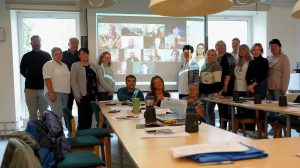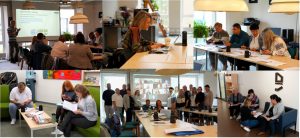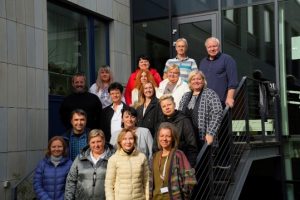Project Description

ClimEd Training #5: Applying Different Technologies of Blended/Online Learning in Education
The ClimEd 5th Training on “Applying Different Technologies of Blended/Online Learning in Education” took place in a hybrid mode during 30 September – 4 October 2024. The ClimEd project trainings are focused on training the faculty/ teaching/ research staff and postgraduates at the ClimEd partner institutions and collaborating organizations in advanced educational and information-and-communication technologies for building a flexible multi-level integrated practice-based education system in the field of Climate Services, Climate Change Adaptation and Mitigation.
In total, 34 persons (including 31 females and 3 males; and 6 young teachers/researchers) were accepted to participate in this onsite/online (hybrid) training. These were from the Ukrainian ClimEd partners and other institutions such as the Odesa I.I. Mechnikov National University, Kyiv National University of Construction and Architecture, O. Beketov National University of Urban Economy, Lviv Polytechnic National University, Bila Tserkva National Agrarian University, Taras Shevchenko National University of Kyiv, V. N. Karazin Kharkiv National University, National University Odessa Maritime Academy.
The training started with a series of lectures during 30 September – 4 October 2024. The presented lectures covered the following topics/ blocks: Block I. Foundations of Climate Education and Technology Integration (B1) Block II. Designing Engaging Blended Learning Experiences for Climate Topics (B2); Block III. Developing and Assessing Online Exams for Climate Education (B3); Block IV, Advancing Climate Education through Online Platforms (B4); Block V. Group Reporting on Projects and awarding ceremony, and finally, the Introductions to Home-Work-Assignments (HWAs). All materials of the training (slides and videos of lectures, presentations of exercises and homework assignments as group projects, etc.) are now available at: http://climed.network/events/climed-trainings/climed-training-5/
All Groups got high scores, and, respectively, have been awarded the certificates and invited participants for the ClimEd 6th Training (expected in January-February 2025 as onsite/online (hybrid) training in Estonia). It was stressed that participants of the training had obtained an understanding of climate education through advanced educational technologies, examining climate policy and objectives, and how blended and online learning can enhance teaching effectiveness. They learned to design and implement blended learning strategies that combine online and traditional teaching methods to enhance climate education. Practical workshops provided them with hands-on experience in creating interactive learning modules on climate topics. Additionally, participants mastered the use of Moodle for developing online exam questionnaires, enabling them to effectively assess blended learning experiences.
The introduction to Group Work as Small-Scale Research Projects (SSRPs) to be realized as group projects was given to participants on 30 September 2024. On 3 October 2024, a series of short oral presentations about Group Project plans was delivered by each Group (named E1-E8). Each group realized work in Groups on projects as its projects. The main focuses for SSRPs were be on mastering Moodle for creating online exam questionnaires to arm educators with the expertise to design, deliver, and assess blended learning experiences. Main goal fpr each Group was developing Exam Questionnaires for the Moodle Environment for Climate Change educational programs.
The e-evaluation of the ClimEd 5th Training was done using two questionnaires distributed among participants. Following the 1st questionnaire – (Evaluation of the Training) – 100% of the participants estimated overall rating for this course as” very good” and “good”; training materials were of “excellent” (75%), and “very good” (25%) quality and information about the training was sufficient (100%), and participants will recommend such training to colleagues (100 %). Following the 2nd questionnaire – (Self-Evaluation of the Obtained Competencies and Skills) – about 98% of participants “fully agreed” and “mostly agreed” that they have obtained/ improved their competencies and got skills working as groups.
Special thanks to all lecturers of the training – MSc Peep Mardiste, Educational technologist Veljo Kabin, Dr. Kalev Sepp (from Estonian University of Life Sciences, Estonia) Dr. Jon Xavier Olano, Dr.Enric Aguilar, Dr.Anna Boqué and PhDCaterina Cimolai (from Universitat Rovira i Virgili from Spain); Dr.Tuukka Petäjä, Dr. Laura Riuttanen, Dr.Risto Makkonen (Institute for Atmospheric and Earth System Research (INAR), Department of Physics, University of Helsinki, Finland), Prof. Tetiana Tkachenko, (Kyiv National University of Construction and Architecture, Ukraine)– for their professionalism, enthusiasm, and commitment to the training; and EULS team – Dr. Kalev Sepp; Dr.Volha Kasakevich, and Educational technologist Veljo Kabin – for excellent organization and warm atmosphere during the training. Thanks to the ONU team members (Dr.Valeriya Ovcharuk, Dr. Inna Khomenko, Dr. Nataliya Bulat, and IT-manager Vladimir Andrusenko) for support with ClimEd relevant modules development; e-evaluations; continuous web-update of the training materials.
Text by: Inna Khomenko, Valeriya Ovcharuk (ONU)
15 October 2024


